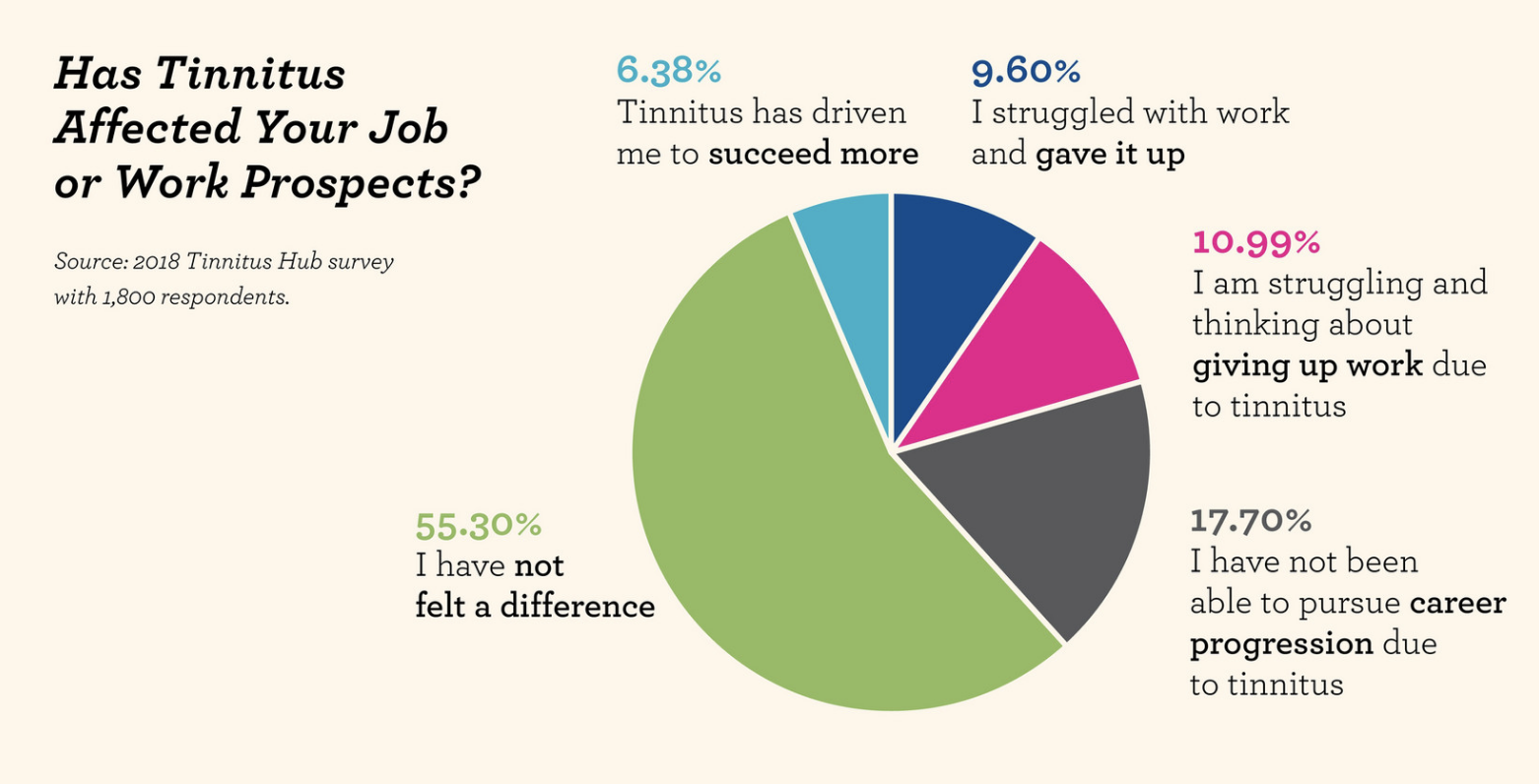By Hazel Goedhart and Markku Vesala
Work is an important part of one’s social environment and often provides a sense of achievement and self-worth. However, the data we’ve collected at Tinnitus Hub shows that more than a third—38 percent—of people who say they have tinnitus say that the condition has negatively affected their work prospects.
This is not only life-changing for the person in question, but also means that tinnitus has a huge economic impact. As a volunteer-based, patient organization that runs Tinnitus Talk, a global online community for people with tinnitus, we would like to draw attention to this societal problem and push for tinnitus to be taken more seriously as a potential impediment to work.
Trouble Focusing
The biggest impact on work likely stems from difficulties with concentration, which many people with tinnitus report. Survey respondents indicate that tinnitus has affected their concentration mildly (41 percent), moderately (33 percent), or even severely (20 percent). Only a small minority report no concentration issues.
This differs from the “concentration fatigue” that people with hearing loss can experience, when the brain has to put in extra effort to get the input it needs. Rather, it’s an effect of experiencing constant noise in one’s head and having to push that to the background in order to focus on other things.
Of course, not everyone with tinnitus struggles, and many function in daily life without problems. The severity of tinnitus ranges across a spectrum, and often people who struggle at the onset of tinnitus later find good ways of coping. Nonetheless, severe tinnitus is frequently accompanied by anxiety and/or sleeplessness, which impacts the ability to focus at work. As one of our survey respondents puts it: “People don’t understand the everyday stress of always hearing a high-pitched sound.”
Challenging Work Environments
Certain professions expose people to loud sounds that may cause hearing damage and/or tinnitus. These professions include military service, construction, manufacturing, and the music industry.
A member of the Tinnitus Talk support forum posted about wanting to become a police officer. He stated that he is currently functioning very well with his tinnitus but was concerned about a potential setback due to the requirement to handle firearms. “In the police academy I would have shooting classes, and I am worried about it. This is the job I have always wanted.”
Even exposure to lower-level sounds all day long, such as in a restaurant, call center, or primary school, can be harmful. People with tinnitus often suffer from increased sound sensitivity (hyperacusis), which means that an office work environment with typical levels of noise can end up causing ear pain or spikes in tinnitus. Patients may have to change jobs or give up their careers because of having tinnitus or hyperacusis.
Simply getting to work can be a struggle for someone who is hypersensitive to sound: “It’s not easy sometimes. A city transit bus is a noisy environment and causes spikes that make me want to drive an ice pick into my ear, but I refuse to let this cripple me to the point where I can’t earn a living.”
Reactions From Employers and Coworkers
Many discussions on Tinnitus Talk highlight a lack of understanding from employers or colleagues and a lack of willingness to make adjustments to help the person with tinnitus. Some people hesitate to speak openly about their tinnitus. “I would like to be more open about my tinnitus, but I am afraid to as I will be discriminated against in my workplace. And now that I am looking for a job, I am even more fearful.”
One can try to explain the tinnitus experience to colleagues, but a big issue is that tinnitus, like hearing loss, is a hidden condition and thus easily forgotten. Some people face disbelief or are even mocked by their coworkers for their tinnitus.
The Way Forward
So, what can be done? There are some relatively simple steps that employers and employees can take to help.
Some people find it impossible to work due to tinnitus-induced anxiety and may need to take sick leave or a period of absence. When possible, this should be accommodated. For the vast majority, the anxiety passes, and after weeks or months or years, habituation sets in. Others may have to make permanent adjustments, like settling for a less demanding career. Be open to discussing the options available.
Adjusting sound levels at the workplace is not always possible, but small changes can have major positive impacts, such as adjusting seating and allowing the use of headphones to provide white noise or minimize outside sound. Employers can also allow employees to work from home if possible. Each person’s needs are unique, and often merely trying to understand those needs and being accommodating can make all the difference to an employee with tinnitus.
Educating employers and HR departments is essential to helping resolve career barriers faced by people with tinnitus. If you need advice as an employer/employee or want to share your story, please join us on the Tinnitus Talk support forum.
Hazel Goedhart is a director and the chief strategist for the U.K.-based organization Tinnitus Hub, founded by Markku Vesala. All referenced data comes from online surveys conducted by Tinnitus Hub. For more, see tinnitushub.com and tinnitustalk.com.



